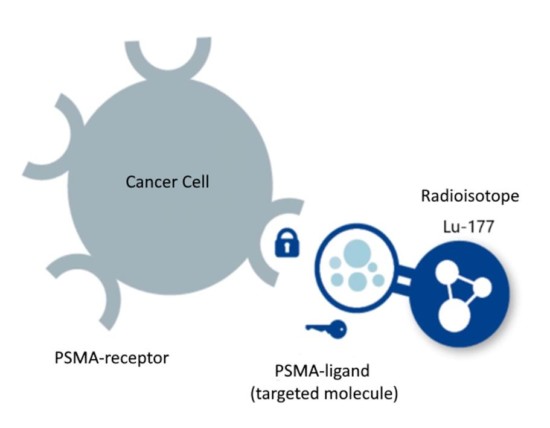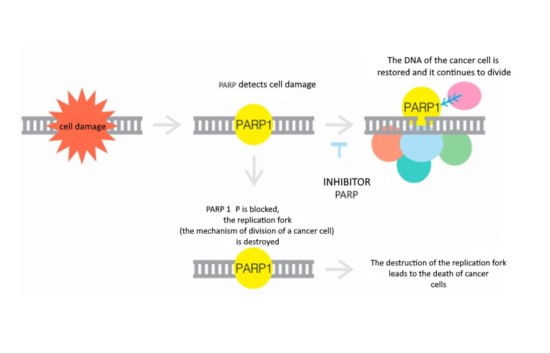Calls for Ukraine
Calls for Europe
Calls for USA
 Prostate cancer is one of the five diseases that lead to death among men worldwide. The Centers for Disease Control and Prevention are noting a dangerous trend. While the overall incidence of prostate cancer in the United States is declining, the number of patients with metastatic form of the disease is steadily increasing. Over 5 years, the number of patients with this diagnosis has increased from 4% to 8%. Unfortunately, such statistics are not kept in Ukraine. However, there is evidence that in 36-44.2% of patients, malignant prostate tumors are detected at stage 3-4.These are alarming figures, since the spread of prostate cancer almost always leads to death.
Prostate cancer is one of the five diseases that lead to death among men worldwide. The Centers for Disease Control and Prevention are noting a dangerous trend. While the overall incidence of prostate cancer in the United States is declining, the number of patients with metastatic form of the disease is steadily increasing. Over 5 years, the number of patients with this diagnosis has increased from 4% to 8%. Unfortunately, such statistics are not kept in Ukraine. However, there is evidence that in 36-44.2% of patients, malignant prostate tumors are detected at stage 3-4.These are alarming figures, since the spread of prostate cancer almost always leads to death.
Less than a third of patients survive 5 years after diagnosis.
Current treatments include surgical removal of the prostate gland and radiation therapy. This scheme is in many cases supplemented by taking hormonal drugs to reduce testosterone levels. However, there are types of tumors that do not respond to standard treatment. For example, metastatic castration-resistant prostate cancer (mCRRPJ). In this form of the disease, the tumor continues to grow, even if the amount of testosterone in the body decreases to a very low level. Currently, an active search for new methods of treatment is underway. Recent advances in understanding the molecular mechanisms of cancer development have given rise to the emergence of targeted prostate cancer therapy methods. Targeted therapy (from the English target — goal) is a technique that involves a
targeted effect on cancer cells. Its purpose is to destroy or «turn off» certain molecules that stimulate the growth of a malignant neoplasm. Since targeted therapy acts selectively, it is associated with fewer side effects than chemo or radiation therapy. The new treatment can be used both independently and in combination with
other methods of antitumor therapy.
Targeted drugs are able to recognize and target molecules that control certain functions of malignant cells. They can affect their division and growth, as well as their interaction with other cells in the body. The advantage of targeted therapy is that it has a targeted effect and does not affect healthy cells. Minus — this type of treatment is suitable only for those patients who have mutations in tumor cells. Before making a decision on the appointment of targeted therapy, the patient will be assigned special diagnostic tests. They help the doctor to get detailed information about the tumor.
In some cases, an oncologist may recommend targeted therapy in combination with standard treatment (surgical removal of the tumor plus radiation therapy). There is evidence that the use of targeted drugs as part of complex therapy helps to improve the prognosis and increase the chances of survival of patients with metastatic prostate
cancer.
Currently, there are two types of targeted therapy that have proven effective in the
treatment of prostate cancer.
Significant risk factors for prostate cancer are mutations occurring in the BRCA genes. The presence of such gene changes in the patient indicates a more severe and aggressive course of the disease. The prognosis in such patients is much worse. Men with a mutation in the BRCA genes are more likely to develop metastases. In addition, prostate cancer in patients of this group often develops at a young age. This dramatically reduces their quality of life and negatively affects their social and personal status.
Mutations in the BRCA gene in prostate cancer patients, on the one hand, indicate a more severe course of the disease, and on the other hand, the possibility of targeted therapy. In May 2020, the U.S. Food and Drug Administration (FDA) authorized the use of PARP inhibitors for the treatment of advanced hormone-resistant prostate cancer.The DNA of the cancer cell is restored and it continues to divide

The mechanism of action of these drugs is quite complex. During a person’s life, both healthy and cancer cells are exposed to radiation, ultraviolet radiation and free radicals. This leads to damage to cellular DNA. PARP enzymes are responsible for its recovery. The targeted drug blocks PARP, preventing the DNA of cancer cells from being restored, as a result of which they die. PARP inhibitors are particularly effective in the presence of mutations in the BRCA1 and BRCA2 genes. The drug is available in the form of tablets that need to be taken twice a day.
This is another promising type of targeted therapy for prostate cancer. The action of the antitumor drug is directed at prostate specific membrane antigen (PSMA). It is a protein that is found on the surface of prostate cells. In 80% of patients with prostate cancer, it is found in large quantities, which makes it an attractive target for targeted therapy. If the cancer spreads to other parts of the body (metastasizes), PSMA will also be detected in them.
The targeted drug consists of a molecule (PSMA ligand) that attaches to PSMA receptors on the surface of cancer cells. It is associated with the radioactive substance lutetium-177. After entering the body, the PSMA ligand recognizes tumor cells and connects with them. It then releases the radioisotope lutetium-177, which destroys cells. Since the drug acts purposefully, it does not affect healthy tissues. Therefore, treatment is associated with fewer side effects. The ligand lutetium-177-PSMA is injected intravenously into the arm. The treatment cycle is determined by the doctor.
Provenge is the first therapeutic cancer vaccine approved by the US FDA. For patients with advanced prostate cancer, Provenge (sipuleucel-T) is an immunotherapy treatment that uses the power of the patient’s own immune system to detect and target prostate cancer cells.
Provenge has been clinically proven to help prolong the life of patients with metastatic castration-resistant prostate cancer. As a rule, treatment is well tolerated by patients and is associated with mild or moderate side effects. An additional advantage of Provenge vaccine therapy is a short course of treatment: the patient will need only 6 visits to the doctor during the month.
Few patients know that Ukraine has its own anti-cancer vaccines, the treatment of which is much more affordable than in foreign countries. The National Cancer Institute, together with the Institute of Experimental Pathology, Oncology and Radiobiology, has developed a number of immunotherapeutic drugs, the effectiveness of which has been proven during clinical trials. Fill out the form below to learn more about Ukrainian cancer vaccines.
Targeted therapy is usually prescribed for metastatic castration-resistant prostate cancer. Treatment is suitable only for certain groups of patients. Before therapy with PARP inhibitors, the doctor needs to find out if the patient has mutations in the BRCA1 and BRCA2 genes. For this purpose, the following analyses can be assigned:
• genetic analysis for gene mutation;
• genomic profiling of tumor tissue;
• sequencing of tumor DNA in the blood.
According to research, about 25% of people with prostate cancer have genetic mutations and are candidates for targeted therapy with PARP inhibitors. In order to find out whether the patient is suitable for Lu-177 PSMA therapy, a
special imaging study Ga-68-PSMA-PET /CT is performed. This is a PET/CT scan using a radiopharmaceutical. It allows the doctor to see the foci of malignant cells in the patient’s body.
PARP inhibitors were approved by the FDA in 2020. Clinical trials have proved that the treatment of patients with prostate cancer with BRCA mutations with these drugs has doubled their life expectancy without disease progression. In addition, a higher overall survival rate of patients was noted. Many of them experienced regression
(tumor reduction).
Lu-177 PSMA therapy received FDA approval in 2022. A clinical trial showed that treatment with the drug helped to reduce the likelihood of death of patients by 38%.
As already mentioned, the main advantage of targeted therapy is its targeted effect,
which allows to reduce the number and severity of adverse reactions. However, some
patients may experience side effects such as:
• Nausea, vomiting;
• Diarrhea, constipation;
• Chronic fatigue;
• Dry mouth;
• Lack of appetite;
• Anemia (decrease in the number of red blood cells);
• Thrombocytopenia (decreased platelet count);
• Skin rash;
• Joint pain;
• Swelling of the legs;
• Cough or shortness of breath.
Sometimes targeted therapy does not cause side effects. In most cases, they are mild
and pass quickly after the end of treatment. Severe adverse reactions are rare.
If you need targeted prostate cancer therapy or want to learn more about this
innovative treatment method, fill out the form online or call one of the phones listed
on the website. Our medical coordinators will contact you in the near future and
select the foreign clinic that best suits your needs. We will also help solve all
organizational issues. The services we provide are free of charge. The patient pays
the cost of treatment at the cash desk of the selected medical center.
Sourceshttps://www.news-medical.net/
https://link.springer.com/
https://www.sinobiological.com/
https://www.cancer.org/
https://www.webmd.com/
https://www.mskcc.org/
Please rate the work of MedTour
